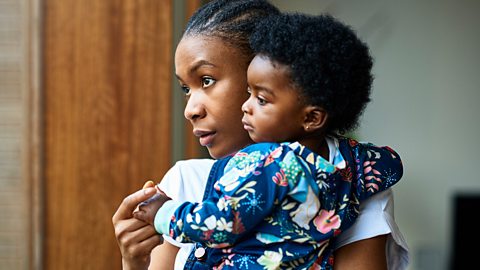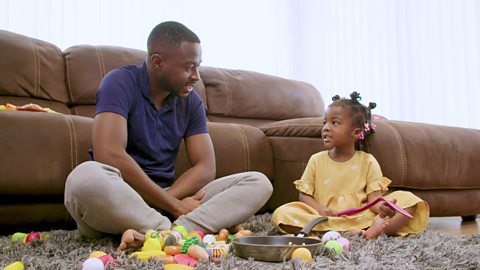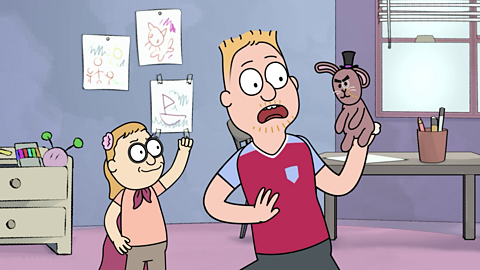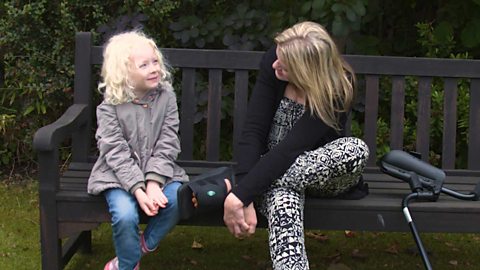Death is a topic that we sometimes struggle to talk about as adults, so how are we meant to approach it with young children?
Whether your child has experienced a loss or has asked you about death because they are curious, it’s really important not to hide away from this big conversation.
‚ÄúIt‚Äôs a topic we all shy away from because it‚Äôs scary and it‚Äôs sad,‚ÄĚ says Nicola Creaser, the Bereavement Services Regional Lead at Child Bereavement UK. ‚ÄúBut it does happen to all of us and it‚Äôs important to help children understand that.‚ÄĚ
But how much are you meant to tell them? And what exactly do they understand when they’re so young?
We asked Nicola to share her advice for talking about death and loss with a young child.

Why is it important to talk to a child about death?
Talking to a child about death can help them feel better supported and more secure if they do experience a loss.
‚ÄúIt's huge when somebody dies,‚ÄĚ says Nicola. ‚ÄúBut if you're someone who doesn't even know that death exists or didn‚Äôt even consider it could happen, it makes it even scarier.‚ÄĚ
One of the reasons death can be so scary for young children who don’t have all of the information is because of their imagination.
‚ÄúChildren have brilliant imaginations and they are likely to make up what's happened in their head, which is normally ten times scarier than the actual truth,‚ÄĚ explains Nicola.
They might imagine that a person died because of something they said or did, or that what happened to that person could also happen to them soon.
So even though these conversations will be difficult, especially if you are experiencing a loss yourself, they’re really important to have.
What do young children actually understand about death?
It's easy to assume that really young children don’t grieve because they don’t have a full understanding of what’s going on.
But even though they don’t grieve in the same way that adults do, they can still notice a loss and will have their own way to process that information.
Six months to two years
‚ÄúBetween six months and two years, children are very aware that a person is missing,‚ÄĚ explains Nicola. ‚ÄúEspecially if it's one of their main caregivers.‚ÄĚ
Nicola explains that young babies can also notice if their other caregivers are emotionally withdrawn and when something is not right with them.
So even if they can’t express it, they are picking up on these emotions and may react to them by crying more or becoming more withdrawn themselves.
Two to five years
As they get a little bit older, children can understand that someone's not there.
‚ÄúWhat they don‚Äôt understand is the permanence of death.‚ÄĚ
‚ÄúReally young children under five don't understand what forever is,‚ÄĚ explains Nicola. ‚ÄúSo a lot of the time children that age will ask about the person who has died repeatedly.‚ÄĚ
‚ÄúIt‚Äôs normal for kids this age to be happy and playing but then for them to just turn around and ask whether that person is still dead. That‚Äôs because it's always on their mind and they're just checking that the answer is the same because they don't understand that permanence.‚ÄĚ

How should you talk about death to a child?
When you’re talking to a young child about death, the most important thing to consider is your choice of words.
Language is really important for young children because they don’t have full comprehension yet.
‚ÄúIf an adult were to say someone passed away, you would completely understand their meaning,‚ÄĚ explains Nicola. ‚ÄúBut for a young person or a child, the word passed could also mean to walk past something.‚ÄĚ
‚ÄúIf you said you‚Äôve lost someone, a child can literally think that they are lost, like a pet or an object. They might wonder why you don't go and look for them.‚ÄĚ
Explanations such as ‚Äúgone to sleep‚ÄĚ or ‚Äúgone away‚ÄĚ may make children frightened to go to sleep or worry that you might not come back when you leave the house.
It is therefore really important, as scary as it feels, to use words like dead or dying.
Then there are no double meanings.
Age-appropriate language
For children under five, the word death is probably brand new and this could result in a lot of questions.
‚ÄúI think the best thing is to be as honest as possible in a way that‚Äôs appropriate for your child‚Äôs age,‚ÄĚ says Nicola.
Nicola suggests focussing on the physical body when describing death.
‚ÄúWhat I tend to explain to young children is that when you die you don't need your body anymore. You‚Äôre not hungry or thirsty, you don‚Äôt need the toilet and you don‚Äôt get cold.‚ÄĚ
This can be really reassuring for young children, especially when it comes to explaining a burial or cremation.
And if your child has not experienced a loss but you want to bring up this topic with them, Nicola encourages looking to your garden for help.
‚ÄúThe life cycle of a flower is a nice example to use with young children,‚ÄĚ she explains. ‚ÄúIf your child notices that a flower is wilting or changing colour, it‚Äôs a really great opportunity to explain that the flower has died and that's what happens to all living things.‚ÄĚ
What to do if you don’t know what to say
Sometimes your child might ask you a question that you just don’t know how to answer at the moment.
‚ÄúIt's always okay to say you don't know,‚ÄĚ says Nicola. ‚ÄúBecause sometimes that's the honest answer.‚ÄĚ
‚ÄúYou can say you‚Äôre not too sure but also that you will go away and find out for them. Then you can sit down and talk about it later, once you‚Äôve had time to go away and find the right words.‚ÄĚ
You can speak to your partner or a friend, or you can also call the . They might be able to help you gather your thoughts and find the right words.

Activities To Help Grieving Children
Playing games and doing activities together can be really beneficial for young children who have experienced a loss.
Messy painting or drawing, for example, can help a child express their emotions when they don’t have the right vocabulary yet.
Pretend role play is a very common activity for most children when they reach two years old. If your child has experienced a loss, you might find them recreating hospital scenes or funerals. This might feel morbid to an adult but this type of play is how children start to make sense of the world around them and is completely normal.
Sometimes an activity is great because it can simply cheer your child up.
‚ÄúOne thing I do in my work, is talk to children about this idea of a first aid kit,‚ÄĚ explains Nicola. ‚ÄúMost children understand the concept of a first aid kit for physical injuries but we try and create a feelings first aid kit.‚ÄĚ
This involves writing a list, or putting together a bag of items that help when things are hard after a special person has died.
‚ÄúA child might choose a bag of sweets and a photograph of the person who has died,‚ÄĚ suggests Nicola. ‚ÄúOr possibly a teddy bear, or some music that can cheer them up. Anything that helps when things are really hard.‚ÄĚ
What to do if you’re struggling
‚ÄúAs a parent, it‚Äôs natural to want to put your children first,‚ÄĚ explains Nicola. ‚ÄúBut if you are struggling with grief, you‚Äôve also got to ask yourself who is there for you.‚ÄĚ
Think about who you can turn to when you’re having a bad day and need practical help. Can someone look after your child for you, while you focus on things in your own feelings first aid kit?
If you’re not sure who you can turn to, offers help and support to parents and families too.
You can call their helpline on 0800 02 888 40 or live chat via their website.
For more information on , as well as , you can visit their website.
For support with a wide range of issues, visit ≥…»ň¬ŘŐ≥ Action Line.






